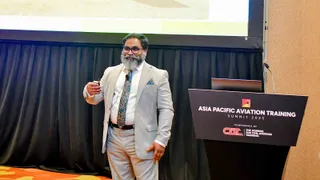WATS/HATS Day 1: Safety Team Opens HATS With ‘Path to Zero’ Vision
Contact Our Team
For more information about how Halldale can add value to your marketing and promotional campaigns or to discuss event exhibitor and sponsorship opportunities, contact our team to find out more
The Americas -
holly.foster@halldale.com
Rest of World -
jeremy@halldale.com

Representing the International Helicopter Safety Team (IHST) and the United States Helicopter Safety Team (USHST), Bristow Group’s Nick Mayhew kicked off the Helicopter Aviation Training Symposium (HATS) stream at WATS 2016 with a challenge to further reduce accidents on “the path to zero.” Ten years ago, the IHST set a target of reducing the civil rotary-wing accident rate by 80% by the end of 2016. Though the goal will not be reached, the rate has nonetheless been reduced by 54% from the 2005 baseline.
The new objective for the next five years is a 20% reduction from the previous five-year average (0.73 accidents per 100,000 flight hours), or a 2019 target of 0.62.
“This doesn’t mean that we accept that as the final mean,” added Mayhew, Commercial Programs Manager and EASA Head of Training at the Bristow Academy. The Safety Teams’ updated vision will also focus on fatal accidents, including issues of survivability and post-crash fires.
Mayhew challenged the perception that a zero accident rate is possible. As of February 2016, there were 41,598 registered rotorcraft pilots in the US. With 115 accidents in the preceding 12 months, that meant 41,483 pilots did not have accidents. He urged the audience to “make it personal. Don’t rely on the safety personnel to carry the safety banner.”
Gordon Harwell, Lead Check Airman and Instructor for oil & gas and aeromedical operator PHI urged the helicopter community to regard regulatory minimums not as a goal but simply a place to start. “We need to move beyond a mindset of compliance and complacence.” He described a performance ladder with steps of survival, safety, effectiveness, efficiency, precision, and perfection, labeling the latter two as the definition of excellence. “Safety,” Harwell suggested, “is a by-product of professionalism.”
PHI created a Destination Zero program which urges their more than 600 pilots to “stand up, speak out, and take action.”
Thales Training & Simulation’s Joel Flinois, Helicopter Simulation Line Product Manager, described the European company’s approach to training academies as a solution for smaller operators who cannot afford to purchase their own flight simulator. Flinois said about 85% of helicopter operators have fewer than five aircraft.One of the challenges, he noted, is that there are 113 variants of helicopter models. “Ideally, there should be a simulator for each type.”


